Weapons - Fotogalerie - Photo gallery
Image database with photographs of ancient art and antiquities
Our image database provides photographs of ancient art and antiquities for press releases as well as for private use. All artefacts sold in our gallery are documented through professional photographs. The resulting image library contains numerous ancient Egyptian, Greek and Roman antiquities as well as ancient coins. The time span from Stone Age, over Bronze Age and Classical Antiquity until Late Antiquity is covered.The photo gallery aims at providing a vast visual archive equipped with filters and search tools. You are most welcome to search the constantly growing number of artefacts in the image library. We are also happy to authorize hyperlinks from your webpage / forum to the objects depicted in our gallery. For this purpose, please send us a short notification prior to placing a hyperlink. For almost every object high definition photographs are available and can be provided e.g. to document your collection or for scientific papers or popular science articles. If you are interested in using pictures for publications, print media or other purposes, please contact us and we will be happy to assist you.
-
 Celtic spear head - found in 1970s near Warminster, UK
Celtic spear head - found in 1970s near Warminster, UKMade of iron, about 1st century BC - 1st century AD. With export permit by the Arts Council of England.
Price: on request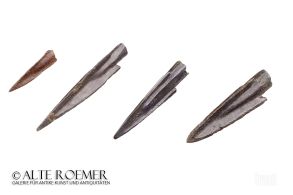 Four Greek or Scythian arrow heads
Four Greek or Scythian arrow headsGroup of four bronze socketed arrowheads with triangular cross-section. Excellent condition, beautiful patina. From an old British collection, acquired before 1980.
Price: on request Western Asiatic macehead
Western Asiatic maceheadHeavy head of a mace with an ovoid shape. Wonderful veined rock. From Early Bronze Age of the Near East.
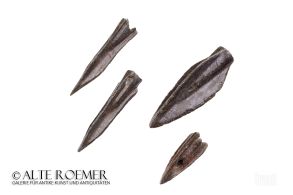 Four Greek or Scythian arrow heads
Four Greek or Scythian arrow headsGroup of four bronze socketed arrowheads, three with triangular cross-section and one leaf-shaped. Excellent condition, beautiful patina. From an old British collection, acquired before 1980.
Price: on request Celtic spear head - found in 1970s near Radstock, UK
Celtic spear head - found in 1970s near Radstock, UKIron, about 2nd century BC - 1st century AD. With export permit by the Arts Council of England.
Price: on request Four Greek or Scythian arrow heads
Four Greek or Scythian arrow headsGroup of four bronze socketed arrowheads with triangular cross-section. Excellent condition, beautiful patina. From an old British collection, acquired before 1980.
Price: on request Western Asiatic macehead
Western Asiatic maceheadHeavy head of a mace with a globular shape. Nicely polished stone. From the Early Bronze Age of Western Asia.
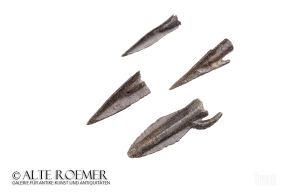 Four Greek or Scythian arrow heads
Four Greek or Scythian arrow headsGroup of four bronze socketed arrowheads, three with triangular cross-section and one leaf-shaped. Excellent condition, beautiful patina. From an old British collection, acquired before 1980.
Price: on request Large ceremonial knife of the Sican culture
Large ceremonial knife of the Sican cultureThe so-called Tumi was a weapon to cut the throats of humans and animals in ritual sacrifices. The knife certainly fulfilled an additional representative function in the afterlife. From the period of the Sican's cultural florescence during the 10th to 12th centuries AD.
Price: on request Scythian short sword
Scythian short swordThe so-called acinaces is a typical weapon of the Scythians. Well preserved piece from the 7th to 5th centuries BC.
Price: on request Ceremonial knife of the Sican culture
Ceremonial knife of the Sican cultureThe so-called Tumi was a weapon to cut the throats of humans and animals in ritual sacrifices. The knife certainly fulfilled an additional representative function in the afterlife. From the period of the Sican's cultural florescence during the 10th to 12th centuries AD.
Price: on request Small ceremonial knife of the Sican culture
Small ceremonial knife of the Sican cultureThe so-called Tumi was a weapon to cut the throats of humans and animals in ritual sacrifices. The knife certainly fulfilled an additional representative function in the afterlife. From the period of the Sican's cultural florescence during the 10th to 12th centuries AD.
Price: on request Celtic spear head - found 1982 near Frome, Sommerset, UK
Celtic spear head - found 1982 near Frome, Sommerset, UKIron, about 2nd century BC - 1st century AD. With export permit by the Arts Council of England.
Price: on request Huge ceremonial knife of the Sican culture
Huge ceremonial knife of the Sican cultureThe so-called Tumi was a weapon to cut the throats of humans and animals in ritual sacrifices. The knife certainly fulfilled an additional representative function in the afterlife. From the period of the Sican's cultural florescence during the 10th to 12th centuries AD.
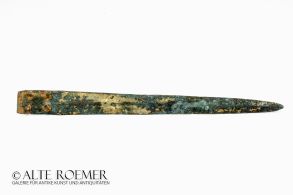 Canaanite bronze blade from General Moshe Dayan collection
Canaanite bronze blade from General Moshe Dayan collectionHoly Land, 3rd - 2nd millennium BC. Exhibited in the Jewish Museum in New York City in 1975. Moshe Dayan was a famous Israeli politician and military leader who served as Chief of Staff of the Israeli Defense Forces, personally commanded the Israeli forces during the 1956 Suez Crisis and served as Defense Minister.
Price: on request Italic bronze belt of a warrior
Italic bronze belt of a warriorStunning samnite bronze work from South Italy. Made in the 5th or 4th century BC, before Romes expansion into Italy. From the famous Guttmann collection.
 Italic bronze belt of a warrior
Italic bronze belt of a warriorNice samnite bronze work from South Italy. Made in the 4th century BC, before Romes expansion into Italy. From the famous Guttmann collection.
 Sword of the Urnfield culture from a museum collection
Sword of the Urnfield culture from a museum collectionWonderfully preserved bronze weapon from the time around 1000 BC. It was made in Central Europe by the Urnfield culture and formed part of a museum collection for almost 70 years.
 Bronze Age casting mould for a lance head
Bronze Age casting mould for a lance headOne half of a stone mould for bronze casting. The equipment is from a workshop of the 2nd Millennium BC, probably from the Carpathian Basin. From the famous Guttmann Collection. This mould was published in a work by Born and Hansen.
 Three neolithic arrowheads from Egypt
Three neolithic arrowheads from EgyptThe Stone Age points are beautifully crafted, with finely serrated edges. From a 100 year old museum collection.
Price: on request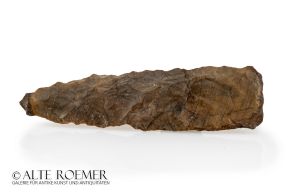 Neolithic stone tool from Egypt
Neolithic stone tool from EgyptThe Stone Age weapon's point or knife blade is well crafted, with finely serrated edge. From a 100 year old museum collection.
Price: on request Three neolithic arrowheads from Egypt
Three neolithic arrowheads from EgyptThe Stone Age points are beautifully crafted, with finely serrated edges. From a 100 year old museum collection.
Price: on request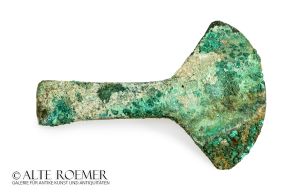 Ceremonial knife of the Sican culture
Ceremonial knife of the Sican cultureThe so-called Tumi was a weapon to cut the throats of humans and animals in ritual sacrifices. The Tumi certainly fulfilled an additional representative function in the afterlife. From the period of the Sican's cultural florescence during the 10th to 12th centuries AD.
Price: on request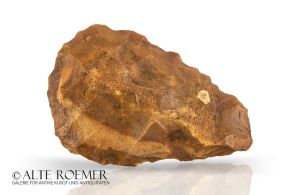 Paleolithic hand axe
Paleolithic hand axeSmall prehistoric stone tool. It was the universal tool of the older Stone age and could be used as a borer or a cutter. From a 100 year old museum collection.
Price: on request
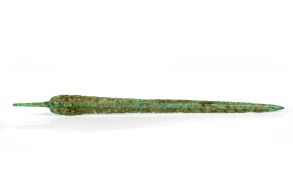 Near Eastern bronze sword
Near Eastern bronze swordDouble-edged blade of a Bronze Age sword, the hilt missing. From the middle of the 2nd Millennium BCE.
Price: on request Paleolithic hand axe
Paleolithic hand axePrehistoric stone tool. It was the universal tool of the older Stone age and could be used as a borer or a cutter. From a Swiss museum collection. Found in Ouarzazate, Morocco.
Price: on request Stone Age spearhead from North America
Stone Age spearhead from North AmericaFinely crafted flint projectile from the Stone Age of North America. From a swiss museum collection.
Price: on request Stone Age spearhead from North America
Stone Age spearhead from North AmericaFinely crafted flint projectile from the Stone Age of North America. From a swiss museum collection.
Price: on request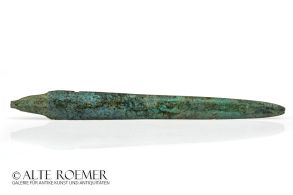 Large Near Eastern lance head
Large Near Eastern lance headDouble-edged blade of a lance from Bronze Age. With a nice green patina.
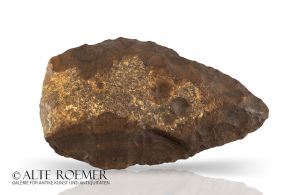 Paleolithic hand axe
Paleolithic hand axeSmall prehistoric stone tool. It was the universal tool of the older Stone age and could be used as a borer or a cutter. From a 100 year old museum collection.
Price: on request Paleolithic hand axe
Paleolithic hand axePrehistoric stone tool. It was the universal tool of the older Stone age and could be used as a borer or a cutter. From a Swiss museum collection. Found in Algeria, North Africa.
Price: on request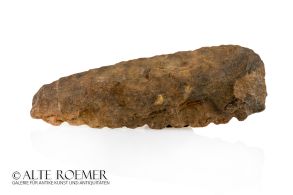 Neolithic stone tool from Egypt
Neolithic stone tool from EgyptThe Stone Age weapon's point or knife blade is well crafted, with finely serrated edge. From a 100 year old museum collection.
Price: on request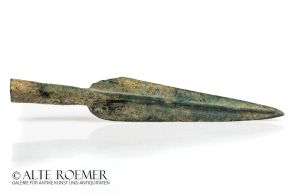 Luristan bronze spearhead
Luristan bronze spearheadDouble-edged blade of a large spear from the Luristan region in Ancient Iran. Impressive speciment with nice patina.
Price: on request Near Eastern lance head
Near Eastern lance headDouble-edged blade of a lance from Bronze Age. With a nice green patina.
Price: on request Paleolithic hand axe
Paleolithic hand axePrehistoric stone tool. It was the universal tool of the older Stone age and could be used as a borer or a cutter. From a Swiss museum collection. Found in Algeria, North Africa.
Price: on request

